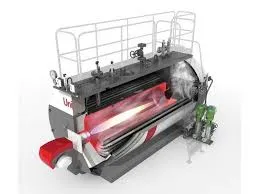
Nov . 14, 2024 19:49 Back to list
steam boiler water treatment
Steam Boiler Water Treatment Ensuring Efficiency and Longevity
Steam boilers play a vital role in various industries, providing heat and energy for a wide range of applications. However, the efficiency and longevity of these systems depend significantly on proper water treatment. Effective treatment of boiler water not only enhances performance but also prevents costly repairs and potential hazards associated with boiler failures.
Importance of Water Quality in Steam Boilers
Water quality is paramount in steam boiler operations. The presence of impurities in the boiler water can lead to several issues, including corrosion, scaling, and foaming. Corrosion is particularly concerning as it can weaken boiler components, leading to leaks and failures. Scaling occurs when minerals such as calcium and magnesium precipitate out of the water, forming deposits that restrict heat transfer and decrease efficiency.
Additionally, unmonitored water chemistry can cause foaming, which affects the quality of the steam produced and can lead to water carryover, where water enters the steam system. This not only reduces steam quality but can also cause damage to downstream equipment, including turbines and heat exchangers.
Key Components of Boiler Water Treatment
To ensure the safe and efficient operation of steam boilers, a comprehensive approach to water treatment should be established
. The following components are critical in maintaining water quality1. Water Testing Regular analysis of boiler water chemistry is essential. Parameters such as pH, hardness, alkalinity, dissolved oxygen, and Total Dissolved Solids (TDS) should be monitored to identify potential issues early and take corrective action.
steam boiler water treatment

2. Pre-treatment Before water enters the boiler, pre-treatment processes such as softening, deionization, or reverse osmosis can be employed to remove hard minerals and impurities. This step is crucial in minimizing scaling and maintaining proper boiler operation.
3. Chemical Treatment Adding specific chemicals to the boiler water can help control pH levels, prevent corrosion, and mitigate scale formation. Common treatments include oxygen scavengers, pH adjusters, and scale inhibitors. It is vital to select the right chemicals based on the specific characteristics of the water and the type of boiler.
4. Blowdown Practices Blowdown refers to the process of removing a portion of the concentrated water from the boiler to control the concentration of impurities. Regular blowdown helps maintain optimal water chemistry and reduces the risk of scaling and corrosion.
5. Monitoring and Control Automation systems can significantly enhance boiler water treatment by continuously monitoring water quality parameters and automatically adjusting chemical dosage and blowdown rates. This not only improves reliability but also reduces manual labor and the risk of human error.
Conclusion
Effective water treatment is essential for the reliable and efficient operation of steam boilers. By understanding the importance of water quality and implementing a comprehensive treatment plan, industries can protect their boiler systems from damaging effects caused by impurities. Regular testing, appropriate pre-treatment, chemical treatment, and blowdown practices are crucial steps in maintaining optimal water conditions.
In today’s competitive environment, investing in proper steam boiler water treatment not only extends the lifespan of the equipment but also promotes energy efficiency, ultimately leading to cost savings for businesses. The benefits of a well-maintained steam boiler system are clear, making water treatment an indispensable part of boiler operation strategy. As industries continue to evolve, those that prioritize effective water treatment for their steam boilers will likely find themselves at an advantage, ensuring safe and efficient operations for years to come.
-
High-Efficiency Commercial Oil Fired Steam Boiler for Industry
NewsJul.30,2025
-
High-Efficiency Biomass Fired Thermal Oil Boiler Solutions
NewsJul.30,2025
-
High Efficiency Gas Fired Thermal Oil Boiler for Industrial Heating
NewsJul.29,2025
-
High-Efficiency Gas Fired Hot Water Boiler for Sale – Reliable & Affordable
NewsJul.29,2025
-
High Efficiency Biomass Fired Hot Water Boiler for Industrial and Commercial Use
NewsJul.29,2025
-
High-Efficiency Biomass Fired Hot Water Boiler for Industrial Use
NewsJul.28,2025
Related PRODUCTS






















